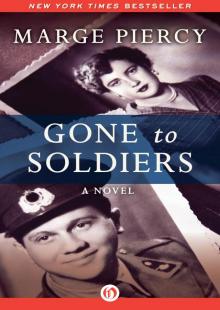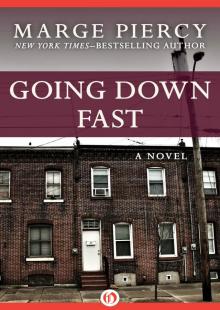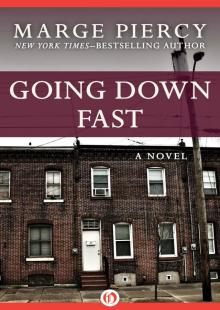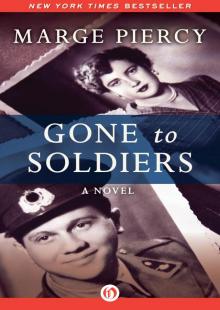- Home
- Marge Piercy
The High Cost of Living Page 2
The High Cost of Living Read online
Page 2
“I’ve never been anyplace. Except in my head. But being a tourist sounds tacky. I’d like to travel, but for some compelling, some inherent reason.”
Leslie laughed. “Like being a fugitive?”
“Don’t laugh at me, Leslie. I hate to be laughed at. I always find a way to punish Paul when he does that.”
“When Daddy was going to take us all to Niagara Falls, you wouldn’t go,” Cam said suddenly, chin on the seat back.
“Well, imagine going to Niagara Falls with Daddy and you and Mignon!”
Mignon must be another sister, whom she imagined as older than Honor, just as beautiful and already interested in women. And throw in a legacy from a rich aunt. “Does she live at home too?” Please not.
“No, she’s in Columbus with her family,” Cam said. “Poor Mignon.”
“Why do you say that?”
“I don’t know.” Cam yawned warmly in her ear. “We always say that. Why do we always say that?”
“Because she has three children at twenty-four, she’s sweet and darling, her husband only married her for her looks, and she’s losing them already.” Honor shook her head and her long hair slithered back and forth. “Stop, Leslie, right now!”
“We’re nowhere near your house yet.”
“That dismal-looking diner. We need to make Cam presentable.”
“Come on, Honor. Cam’s an adult. Surely she can come in a little soused.”
“Not wih her,” Cam said. “But I’ll keep my mouth shut.”
“Camille! You can’t walk without shuffling!” Honor screwed around in her seat.
“Yes I can. Right past Mother dear. Nighty-night.”
“Besides, she’ll be brimming with questions. You know.”
“Why didn’t she come to the play if she wanted to keep an eye on you?” Leslie parked and they walked back half a block. The all-night diner stood across from the gates of a Kelvinator plant and served the night shift. There were eight or nine men in the place, including two cops at the counter. Walking past them all to the booth, Leslie felt peppered with stares. She always felt conspicuous, but here were Cam in her purple satin jumpsuit and Honor in a long velvet gown.
“Been out on the town, girls?”
“Partying,” Cam started to say when Leslie nudged her into a booth at the end. Edgily she pulled off her gloves and her left hand rubbed the callused edge of her right palm. She noticed she was sweating. But she was not really with Cam or Honor; neither of them, that is, was her lover, with whom she walked always warily, always in fear of being attacked. Her jaw gave a twinge and she discovered she was gritting her teeth. Neither Cam nor Honor seemed nervous. Cam was drunk past caring and Honor seemed flattered by the comments, the stir. She had taken several minutes shrugging off her coat before sitting in the booth.
“Leslie, you look quite grumpy. Are we keeping you from something? Or someone?” Honor raised her little eyebrows, undecided whether to flirt or be annoyed.
“Only a room with the heat turned off. Don’t worry.” If only she could stop herself from worrying. It was a sickness to be balanced always on the blade of anxiety, twanging alertness. Yet the first time she had been attacked, she had been purely thoughtlessly happy, overflowing with a clear liquid ample joy as she walked with Val out of a Howard Johnson’s and across the parking lot. Two men blocked their way. At first she had not understood. Val and she had been walking intertwined, that was all. She could still see that man’s face bloated with righteous anger then a fist coming. She had not known how to fight. She had never hit anyone except for paddling her dog Satan when he had been naughty on the floor, or once in a while whacking her youngest brother. All she had done was scratch the man’s cheek before he had left her in the parking lot with a broken jaw.
She had played that scene fifty thousand times. “A male atmosphere like this one makes me edgy.”
“It’s pretty … greasy.” Honor giggled. “Our entrance was the event of the night. Here comes our waitress.”
Leslie relaxed. She was ridiculous sometimes. Maybe it was the four months of working on the rape hot line right after she had come to Detroit. Black women, white women, old ladies, kids, all bleeding. Never again, she could not take it. She could not live with that knowledge of pain. Just to mind her own business and survive, somehow intact. “Three black coffees—”
“I don’t wish coffee, and I don’t take it black,” Honor interrupted, bridling. “I would like tea.”
“Not for you. For Cam. And a glass of milk for me.” It was the only thing she could find to consume. She was too wired to drink coffee and she would not eat bad food.
“Oh, that’s a good idea. I’ll have milk too, instead. And pie—What kind of pie do you have? Blueberry with strawberry ice cream.” When the waitress had left, Honor leaned forward. “I’m sorry I jumped at you. I thought you were being officious. You’re so practical!”
“So practical. I spend my days sorting hundred-year-old rent receipts. Or I feed a balky computer information on capital formation trends and capital accumulation in selected northern industrial centers during the post-bellum period. At least with the Simpson papers I dig up ancient scandals, like finding fossil condoms in a bed of sandstone.” She wasn’t doing anything wrong, just showing off a little.
“Simpson papers? What are they?”
“The Simpsons are local money. They left the University their family archives and a tidy sum. We’ve got grant proposals out for the capital development project, but the Simpson papers are what’s supporting me.”
“Were there really old scandals? Incest and mad wives in the tower like Mr. Rochester?” Honor asked.
“Business chicanery mostly. But there’s syphilis and even a bastard daughter who perished in a fire.
“Arson?”
“They had lots of fires. All the flimsy wooden buildings. Open fires, candles, oil lamps, straw. It was a raw place in the 1870s, which is when the daughter bought it.”
“It’s a raw place now.” Honor shrugged. “I think you’re hired to make that up. I know, in grade school we studied all that: Founded by Antoine de la Mothe Cadillac in seventeen-whatever. But you know it’s a lie. Henry Ford founded Detroit in the twenties, and everything before that is invented. It was put together like a freight train made up of odd boxcars marked Chevrolet and Great Lakes Steel and Wyandotte Chemical. It was all put up at once and now it’s all rotting at once. That’s what you can see. Antoine Mothball is just a story they make up to teach in school.”
The coffees arrived and Cam began drinking the first, shuddering. “Mama’s so fussy about you. What does she expect anyhow? The princess can’t even pee.”
“I don’t think I’ll ever permit myself to get drunk! Ever!”
“Listen, I’m the one in the pot. If anything happens to you, it’s my fault. If you quit, it’s my fault. Paul will fire me. Don’t quit on us, Honor, listen to me.”
“It’s so dull. It looks lovely from the audience, but it’s just sweat and bother. The illusion’s gone and a play is not any more exciting to be in than studying for a chemistry quiz.”
“You like the curtain calls well enough,” Cam mumbled, shaking her head and doggedly drinking the coffee Leslie nudged at her.
“I like the costumes too. It’s not fun to be female any more. I’d love to flirt endlessly with a parasol. All right, you’re safe. I won’t quit unless Paul drives me mad. He’s wicked.” She smiled broadly. “Besides, what else is interesting in my life? Nothing even as exciting as memorizing lines ever happens at General Custer.”
“General Custer?” Leslie asked.
“Her high school,” Cam said.
“You’re in high school?” Leslie sat up even straighter than she usually did. I didn’t touch her and I never meant to.
“Oh, Leslie, did you think I’m older? I think I look older, especially when I’m dressed up like tonight. Do say I look older.”
“Older than what?”
“I do love to
be told I look at least nineteen. I don’t think I’m anything like a typical high school girl. Really, in many ways I’m more mature.”
“And in many ways you’re not,” Cam snarled. “You don’t even go out with boys, but you walk in and start carrying on with Paul. He’s forty-seven and he goes through women by the six-pack. Don’t think you’d mean anything more to him than a quick fuck.”
“Cam, you can’t really imagine I’m about to let him … go through me? I just find him more interesting to flirt with than a sixteen-year-old with bleached hair and pimples.”
“I don’t know. I look over the local talent when I’m passing the school, and I see a few I wouldn’t kick from my double bed.” Cam winked at Leslie.
“They’re stoned all the time, they play music so loud you can’t talk. I don’t know what to say to them—they never read a book from one year to the next. And they have a one-word all-purpose vocabulary: fuck.”
Cam ran her hand roughly through her blonded hair, trying to focus. She started on the third cup. “Besides, what happened to that boyfriend you had? He wasn’t half bad-looking.”
“What ‘boyfriend’? I don’t have ‘boyfriends.’”
“Bernie something?”
“He is not, not my boyfriend. He is my friend. Period.”
Cam yawned hugely. “He’s queer, huh?”
“We’re all rather peculiar,” Honor said icily. “Bernar’”—she pronounced it as if it was French: bearnarr—“is my very best friend, even though we met only two months ago. He’s the only person in the whole world who actually talks with me.”
Leslie remembered something. “Listen, if your mother’s so possessive and concerned, how come she didn’t go to the play tonight? Then she could keep an eye on you in person.”
“Oh, she would’ve, believe me, if she could get off work. The telephone company’s sickening. She works afternoons and evenings—the two to ten shift—as a floor supervisor. That means she stands behind the operators. But by ten-thirty she’s home. Waiting.” Honor looked directly into her eyes. “I like you, Leslie. You talk with me too. Hardly anyone does. Come and visit me. I have morning classes and I’m home from General Custer by one-thirty, except Tuesdays and Thursdays, when I’m on library patrol till four.” Honor’s last words that evening were “I’ll be very hurt if you don’t come.”
two
Hennessy was coming on to Cam, hanging like a slab of plaid-shirted beef over her desk. Leslie saw George notice. George viewed everything that happened in his fiefdom as his business. She had seen him offended when he discovered a minor liaison between his students, not offended for the affair but because he had not known. Ignorance was possible weakness. Now from his inner office he observed Hennessy and Cam.
Summoning Leslie with a wave of his hand, George shut the door. He had an orderly mind and a disorderly office full of coffee-ringed papers and books propped open at some dusty page. A beautiful old map of Detroit hung over his desk, the neat wheel-spoke patterns of the original city radiating. He liked maps and she had pleased him at Christmas by giving him an ordinary soil map of Michigan.
He asked, “How’re you doing?”
“Okay.”
“So uncertain? Big city still hard on you?”
“Not in the long run, I think.”
He had not asked her to sit and she waited. He gave her that small square grin of his. “Sit. Always on protocol. Take nothing for granted.” George was loose limbed and professorial-looking—patched-elbow jackets over corduroy jeans, medium brown hair just to his shoulders with a gentle wave, gold-rimmed glasses and mild brown eyes, a bushy dark brown mustache more definite, more aggressive than his hair, the vain little ways of a man used to being admired. Last September he had come to the city university in a position of strength with an associate professorship and the Simpson papers. What he really wanted to work on was not those family archives but his quantitative history project, the capital development grant he was angling for with half a dozen foundations. That would really set him up. He was still feeling his way in Detroit, systematically checking out alliances and enmities in the history department and incidentally economics because of his econometric interests. He was putting together a model of how everything worked that would be tight enough to run on the computer, while he seemed still to be blinking at it all and just in a friendly laid-back way trying to find his footing in a new situation, a new city.
“I’ve begun to get into the Simpson papers,” she was saying. “The bank archives are richer for us than the family documents. It could be interesting after all.”
“Red.” He tapped her arm very lightly for emphasis, not contact. “Don’t talk about the fun parts.”
“Don’t talk about the papers?”
“Right. Set it all down but pass nothing out of our cozy group. Chortle only with me. There are powerful Simpsons.”
“The representative.”
“He’s the stupid cousin from the wrong line. They only send the failures into electoral politics. No. Chrysler and Goodyear and salt. The salt money is the oldest. I don’t want them getting the wind up.”
“I won’t,” she said, remembering then that she already had, in the diner.
He was watching her face closely. He grinned again. “But you won’t do it anymore.”
“Only once I did.”
“‘That was in another country and besides the wench is dead.’ … Hey, has Mark Hennessy made my secretary yet?”
“Not yet, I believe.”
“Why? I shouldn’t think it would be hard.”
“For him, it would be hard.” She did smile then. “He even tried me.”
“Well, Red, you don’t wear a sign. And in this department you better not.”
Her face caught and she waited. “A lot of warnings today.”
“I don’t have to warn you about that. We both know the world is sick and wants to die. In a year or two—”
“You’ll own this place.” She could not be above a little flattery, when she was sweating fear.
“I wouldn’t take it, Red. It’s not financially sound.” He leaned back on his spine, sticking his feet up on a pulled-out writing surface of his oak desk. “We’re coming in here strong. They need us more than we need them. We brought income.… Let’s start the regular Thursday nights this week.”
“Starting this Thursday?” She went to the dojo Thursday nights.
“Sure. I’ll announce it in the seminar this afternoon.”
“You want me to come early and help Sue set up?”
“Give her a call and ask. She’s got a woman who comes in three days a week, but I don’t know if that suffices. Okay, scoot.”
At her desk in the outer office she shuffled papers, brooding, reviewing. Well, he gave his warnings and made it plain enough. Her relationship with George was naked: the power, the obligations, the rewards. If the power were less blatantly unbalanced, she might even like him, but it did not do to dawdle on that aspect: like criticizing the color of the sky.
Mostly she was grateful because George did not force her to lie to him and because he accepted her as useful, as intelligent, as a good student. He had selected her and her alone to carry with him to his new position and a better fellowship than she could have gotten any other way. He used her and let her work for him without there being any sexual overtones. None. He was neither attracted to her nor repulsed nor excited nor agitated by her being a lesbian; it was merely a piece of data he filed. It meant she could do certain things and not others. For that tolerance she was grateful enough to try to do well the extra tasks that fell on her such as house hunting for him through June and July before he moved his wife and children, such as going early on Thursday to that house finally selected and following Sue’s orders in laying out the goodies for the weekly informal, supposedly noncompulsory meetings of the Simpson papers staff and his own graduate students he liked to hold in his house, on his own territory.
She felt lonely. She almost mi
ssed the time on the rape hot line. It amused her in retrospect how she had selected that her second week in Detroit, thinking she would meet women. Oh, she met women; bleeding, lacerated, vomiting, catatonic. Even the women who worked the hot line seemed to shrink from each other, as if each held too much pain to care to deal with any woman similarly brimming over. She had made only one friend on that job, Tasha, and she felt guilty before her now for quitting. Tasha felt she had let them all down. Now Leslie tried to wear out her loneliness in work, and usually she succeeded.
She lay on the mattress in her apartment, one cold room. She looked forward to spring when it might be more pleasant, for it faced the flat roof of a grocery next door, with a fire escape just outside where she ought to be able to sit in good weather (the previous tenant had left a metal chair rusting there). She had just installed a new lock, scraped old linoleum off the floor, and scrubbed the boards.
She lay on her side, facing the wall that had on it a poster for a women’s poetry evening that Val had silk-screened two years before. Because she was afraid she might be getting a cold, she was drinking rose hip tea. The hot sour tea, the poster kept Val floating just beneath the fragile web of the Simpson archives, her classes, her need for a thesis subject that she spun constantly to keep herself walking over the deep pool of depression always waiting there. That Val should be with her and wasn’t, that somehow she had botched it, that she was here and Val was a hundred and fifty miles away and every day, every single night, that was so. Tears gathered behind her eyes. She did not cry but drank the hot tea and tried to persuade herself to read for a paper she was writing on the railroads and tried to persuade herself she could take the evening off and go to the movies; only she could not imagine that there could be on the screens anyplace images that would speak to her pain, her need, her loneliness, images that would make her feel good. Then the phone rang.
It was not Val. That fact alone kept her numb for a few moments. It was Honor. “Leslie, when you were being so kind and driving us home Friday night, you dropped your scarf in the car.”

 Woman on the Edge of Time
Woman on the Edge of Time The Cost of Lunch, Etc.: Short Stories
The Cost of Lunch, Etc.: Short Stories Made in Detroit: Poems
Made in Detroit: Poems Sleeping With Cats
Sleeping With Cats Moon Is Always Female
Moon Is Always Female The Longings of Women
The Longings of Women Circles on the Water
Circles on the Water Summer People
Summer People Gone to Soldiers: A Novel
Gone to Soldiers: A Novel The Hunger Moon: New and Selected Poems, 1980-2010
The Hunger Moon: New and Selected Poems, 1980-2010 Vida
Vida Fly Away Home
Fly Away Home He, She and It
He, She and It So You Want to Write
So You Want to Write Small Changes
Small Changes Braided Lives
Braided Lives Lord Valentine's Castle
Lord Valentine's Castle Dance the Eagle to Sleep
Dance the Eagle to Sleep City of Darkness, City of Light
City of Darkness, City of Light The High Cost of Living: A Novel
The High Cost of Living: A Novel Going Down Fast: A Novel
Going Down Fast: A Novel My Mother's Body
My Mother's Body Storm Tide
Storm Tide Going Down Fast
Going Down Fast The Third Child
The Third Child The Hunger Moon
The Hunger Moon The Cost of Lunch, Etc.
The Cost of Lunch, Etc. Sex Wars
Sex Wars The High Cost of Living
The High Cost of Living Made in Detroit
Made in Detroit Gone to Soldiers
Gone to Soldiers